Featured
 Let’s give thanks to the “Dilbert” guy. By Lucian K. Truscott IV / Salon
Let’s give thanks to the “Dilbert” guy. By Lucian K. Truscott IV / Salon
In a single YouTube rant, Scott Adams put the lie to reverse racism
What came over Scott Adams last week, that he would take to his YouTube channel and pour gasoline on his career as a well-compensated, even well-loved cartoonist, and set it on fire? In a rant that was immediately recognized as racist, the “Dilbert” creator called Black Americans “a hate group” and told white people that they should “just get the hell away” from Black people. In a later YouTube segment, Adams dismissed any societal progress as “racist change,” including alterations in the tax code.
Confronted with the obvious inadvisability of advocating re-segregating the races in schools, public accommodations and neighborhoods, Adams endorsed a kind of mass white flight with his call to “get the hell away from them.” It is helpful, however, when one of the newly discriminated against “victims” like the Dilbert guy loses it and makes his own racism, and anti-woke racism, impossible to ignore. All of it is just plain old-fashioned racism, and that’s why the likes of Trump and DeSantis will keep using it. Appealing to racism still works. Read more
Political / Social
 Florida Is Trying to Take Away the American Right to Speak Freely. The Editorial Board / NYT
Florida Is Trying to Take Away the American Right to Speak Freely. The Editorial Board / NYT
The bill is an explicit effort to eviscerate a 1964 Supreme Court decision, The New York Times Company v. Sullivan.
This bulwark of First Amendment law requires public figures to prove a news organization engaged in what the court called “actual malice” to win a defamation case. “This isn’t just a press issue,” said Bobby Block, executive director of Florida’s First Amendment Foundation. “This is a death-to-public-discourse bill. Everyone, even conservatives, would have to second-guess themselves whenever they open their mouths to speak or sit in front of a keyboard.” Read more
Related: Ron DeSantis-appointed New College board abolishes diversity office. By Zac Anderson / USA Today
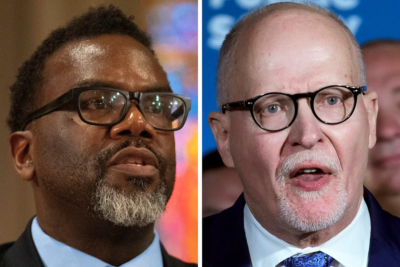 Chicago’s mayoral race hinged on crime. What does that mean for policy? By Eugene Robinson / Wash Post
Chicago’s mayoral race hinged on crime. What does that mean for policy? By Eugene Robinson / Wash Post
The two candidates competing in Chicago’s runoff mayoral election are Cook County Commissioner Brandon Johnson, left, and former Chicago Public Schools chief Paul Vallas. (Nam Y. Huh and Erin Hooley/AP)
Chicago’s runoff mayoral election will tell Democrats a lot about the politics of crime. It will reveal almost nothing, though, about what policies actually lead to safer streets. Crime was by far the biggest issue in the campaign, having sharply increased in Chicago, like other cities, after covid hit. Homicides jumped from 500 in 2019 to 776 in 2020, then peaked at 804 in 2021, according to the Chicago Police Department. Last year, however, homicides fell to 695 — nearly a 14 percent drop. Read more
Related: The Spectacular Fall of Lori Lightfoot. By Charles M. Blow / NYT
 The Excellence of Kamala Harris Is Hiding in Plain Sight. By Donna Brazile / NYT
The Excellence of Kamala Harris Is Hiding in Plain Sight. By Donna Brazile / NYT
I have watched politicians up close for decades. And I have known Vice President Harris for years and urged Joe Biden to make her his running mate in 2020.
I believe that the criticism of her is unrelated to her performance as vice president and fails to account for the role she plays in the White House. Mr. Emhoff summarized the challenges confronting his wife in a 2021 interview. “She has faced challenges as a groundbreaker her whole career,” he said. “When you’re breaking barriers, there’s breaking involved and breaking means you might get cut sometimes, but that’s OK.” Read more
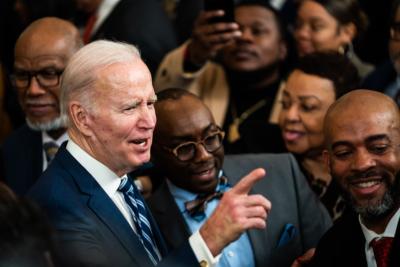 Student loan case could be another blow to Biden’s racial equity push. By Toluse Olorunnipa and Danielle Douglas-Gabriel / Wash Post
Student loan case could be another blow to Biden’s racial equity push. By Toluse Olorunnipa and Danielle Douglas-Gabriel / Wash Post
From community college to pre-kindergarten, Biden’s efforts to close the wealth gap have struggled. President Biden at a White House reception celebrating Black History Month on Feb. 27. (Demetrius Freeman/The Washington Post)
 The homeownership gap between Black and white households hits its widest rate in a decade. By Rob Wile / NBC News
The homeownership gap between Black and white households hits its widest rate in a decade. By Rob Wile / NBC News
Buyers now need to earn more than $100,000 a year if they want to purchase median-priced homes without going beyond their budgets.
After briefly spiking amid pandemic lockdowns, the rate of U.S. homeownership has stabilized at approximately 66%, a solid increase from the post-Great-Recession-low of 63% reached in 2016. Yet over the past decade, the gap in homeownership between Black and white Americans widened to a 10-year high, according to a news release Thursday from the National Association of Realtors (NAR). Read more
 At a small liberal arts college, Black students learned to become ‘bicultural’ to succeed and get jobs – but stress followed. By Elizabeth Arlea / The Conversation
At a small liberal arts college, Black students learned to become ‘bicultural’ to succeed and get jobs – but stress followed. By Elizabeth Arlea / The Conversation
In her forthcoming book, “The Impact of College Diversity: Struggles and Successes at Age 30,” Amherst College psychology professor Elizabeth Aries discovered a disturbing dual reality for Black students going to the small, private liberal arts college where she teaches. On the one hand, interacting with students from different backgrounds better prepared them for the world of higher education and work. But Black students also felt pressured to sacrifice their cultural identities in favor of “whiteness” in order to succeed. In the following Q&A, Aries elaborates on her findings and what they mean as the Supreme Court decides whether to restrict or outlaw the use of race in college admissions. Read more
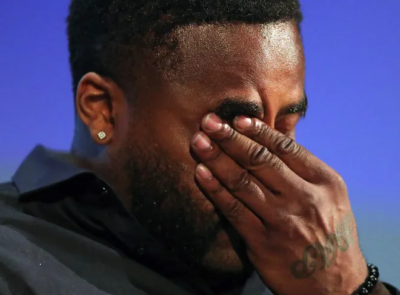 Ohio man wrongly convicted in shooting shares his story with students. By April Helms / USA Today
Ohio man wrongly convicted in shooting shares his story with students. By April Helms / USA Today
He earned a full ride to college. He spent 15 years wrongly imprisoned instead.
A man who spent 15 years in prison for a crime he didn’t commit shared his story with students at the same college he was set to attend. Michael Sutton was invited by the University of Akron’s chapter of the Ohio Innocence Project to share his story about his wrongful conviction during a program Wednesday called “Race and Wrongful Conviction: The Case of Michael Sutton.” Sutton was released from jail in May 2021 after spending 15 years in prison. He was exonerated in September 2022. Read more
Ethics / Morality / Religion
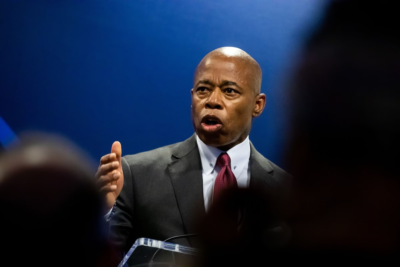 Eric Adams wades into church-state quicksand. By Jenifer Rubin / Wash Post
Eric Adams wades into church-state quicksand. By Jenifer Rubin / Wash Post
At an interfaith breakfast on Tuesday, New York Mayor Eric Adams (D) shocked many in the audience when he suggested guns came into schools when “we took prayers out of schools.”
(One has to wonder whether any public official should really proselytize at such affairs.) It got dicier from there. Adams declared: Don’t tell me about no separation of church and state. State is the body. Church is the heart. You take the heart out of the body, the body dies. I can’t separate my belief because I’m an elected official. When I walk, I walk with God. Read more
 Faith leaders urge Biden to sign executive order for reparations study by Juneteenth. By Adelle M. Banks / RNS
Faith leaders urge Biden to sign executive order for reparations study by Juneteenth. By Adelle M. Banks / RNS
They urged Biden to base an order on the structure of H.R. 40, legislation proposed for decades that has yet to pass on Capitol Hill.
More than 200 interfaith leaders have requested that President Joe Biden establish a commission to study reparations for African Americans by signing an executive order by the newly recognized federal holiday Juneteenth. They urged Biden to base an order on the structure of H.R. 40, legislation proposed for decades that has yet to pass on Capitol Hill, and sign it by the date of the June 19 federal holiday, which marks the day in 1865 that enslaved people in Texas learned they were free. Read more
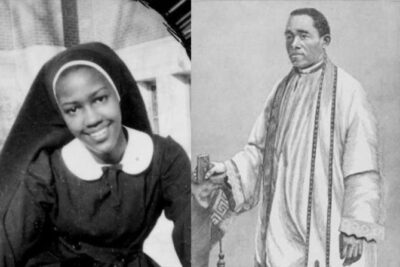 Meet the 6 American Black Catholics who are on the road to sainthood. By Jim Graves / Catholic Newsagency
Meet the 6 American Black Catholics who are on the road to sainthood. By Jim Graves / Catholic Newsagency
Shown is Sister Thea Bowman and Venerable Augustus Tolton. | Courtesy of the Franciscan Sisters of Perpetual Adoration / New York Public Library
Among the best known of these six is Father Augustus Tolton (1854-1897), the first recognized American Black priest. He was born a slave in Missouri and escaped to Quincy, Illinois, through the Underground Railroad. Some Irish priests recognized he had a vocation to the priesthood, so he studied in Rome and was ordained a priest. He returned to Illinois, serving much of the time in Chicago before his death at age 43. Read more
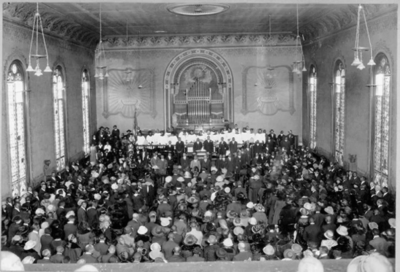 Meet the organization preserving and promoting the stories of Black Methodists. By Emily McFarlan Miller / RNS
Meet the organization preserving and promoting the stories of Black Methodists. By Emily McFarlan Miller / RNS
When most people think of the United Methodist Church, Carol Travis said, they don’t picture Black people. “People still think that the United Methodist Church is white,” said Travis. “You don’t see enough Black faces even though we have been there from the beginning. We never left.”
In 2001, the caucus created the African American Methodist Heritage Center to recover and remember Black Methodists’ contributions to the denomination. Under the leadership of Bishop Forrest Stith, now retired, the center began collecting photos, records, papers from prominent Black Methodists and other artifacts from congregations across the denomination. Read more
 Florida Republicans Hope to Enshrine a Right to Religious Discrimination. Charles McCrary / TNR
Florida Republicans Hope to Enshrine a Right to Religious Discrimination. Charles McCrary / TNR
A Florida defamation bill shrouds a right for conservative Christians to pursue their anti-social civic agenda under the guise of a free speech protection.
Embedded in the bill are exceptions for “religious expression or beliefs” and “scientific beliefs.” If a public figure expresses religious and/or scientific beliefs, these cannot be considered evidence of discrimination. What type of beliefs are these? Before getting into that, we need to understand H.B. 991 and what it purports to do.Can religious beliefs be bigoted, discriminatory, or harmful? H.B. 991 seems to suggest they cannot. There is no conceptual space in the bill for a public figure’s rhetoric to be both discriminatory and religious. Or, another way to think of it: Religious beliefs might be discriminatory, but to say so is defamatory. Read more
Historical / Cultural
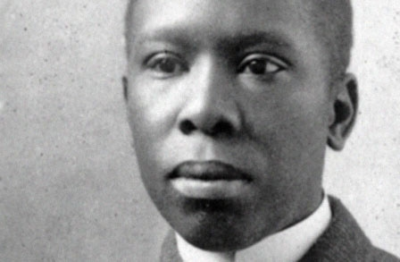 The brief but shining life of Paul Laurence Dunbar, a poet who gave dignity to the Black experience. By Minnita Daniel-Cox / The Conversation
The brief but shining life of Paul Laurence Dunbar, a poet who gave dignity to the Black experience. By Minnita Daniel-Cox / The Conversation
Paul Laurence Dunbar was only 33 years old when he died in 1906.
In his short yet prolific life, Dunbar used folk dialect to give voice and dignity to the experience of Black Americans at the turn of the 20th century. He was the first Black American to make a living as a writer and was seminal in the start of the New Negro Movement and Harlem Renaissance. Dunbar also penned one of the most iconic phrases in Black literature – “I know why the caged bird sings” – his poem “Sympathy.” Read more
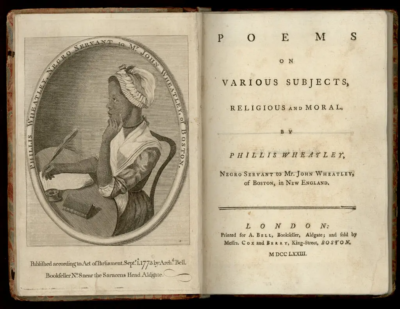 A Fresh Look at a Pioneering Black Voice of Revolutionary America. By Jennifer Schuessler / NYT
A Fresh Look at a Pioneering Black Voice of Revolutionary America. By Jennifer Schuessler / NYT
A new biography places the poet Phillis Wheatley in her own time — and in the middle of the current hot debate about the American Revolution and slavery. Shown is The frontispiece and title page of Phillis Wheatley’s “Poems on Various Subjects, Religious and Moral,” published in 1773. Credit…Collection of the Massachusetts Historical Society
Wheatley — celebrated as the first African American to publish a book of poetry — has long inspired a steady stream of scholarship, tributes and creative remixes. Now comes Waldstreicher’s new book, “The Odyssey of Phillis Wheatley,” out Tuesday, which puts her smack in the middle of the raging debate over the relationship between the American Revolution and slavery. Read more
 International African American Museum Sets Opening for June After Sudden Delay. By Zachary Small / NYT
International African American Museum Sets Opening for June After Sudden Delay. By Zachary Small / NYT
The International African American Museum in Charleston, S.C., is now scheduled to open on June 27. It is at the former Gadsden Wharf, once a large port where thousands of enslaved Africans arrived.Credit…Ellis Creek
The $120 million project, which has been underway for more than 20 years, is devoted to telling the story of the Middle Passage, the journey that began in Africa with the capture of millions of Africans who were forced to cross the Atlantic to Gadsden’s Wharf in Charleston, S. C., and other ports. The museum is located on the site of that former wharf, overlooking Charleston Harbor, where many enslaved Africans first entered the United States. Remnants of the wooden wharf were found by archaeologists in 2014 during an exploratory dig for the museum site. Read more
 Black Women and the Racialization of Infanticide. By Rebekka Michaelsen / AAIHS
Black Women and the Racialization of Infanticide. By Rebekka Michaelsen / AAIHS
“Knowledge of the human body constituted a form of property as important – or even more important than – the body itself in the nineteenth-century United States” (11).
At a time when human bodies were actual tangible property under slavery, historian Felicity M. Turner argues intangible knowledge was also a form of valuable property. At its core, Proving Pregnancy is a call for scholars to recognize knowledge of pregnancy and childbirth as akin to a form of property. To do this, Turner examines infanticide cases in the nineteenth-century United States. Read more
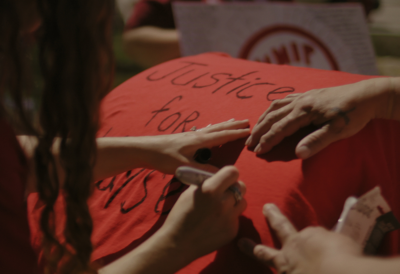 Powerful docuseries spotlights missing and murdered Indigenous women. By Chris Byrd / NCR
Powerful docuseries spotlights missing and murdered Indigenous women. By Chris Byrd / NCR
Originally airing in three one-hour segments in February, all episodes of “Murder in Big Horn” are now available to stream on Showtime.
Indigenous people, as the National Indian Council on Aging reports, according to the U.S. Census, constitute 1.1% of the total U.S. population. Yet, among some Native American tribes, Native women experience murder rates 10 times higher than the national average, the National Indigenous Women’s Resource Center reports. Filmmakers confront that disparity in “Murder in Big Horn.” Augmented by its outstanding contextual analysis, the docuseries’ compelling storytelling heightens awareness about a problem requiring more urgent action: missing and murdered Indigenous women. Read more
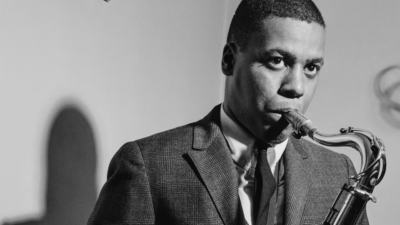 Jazz Just Lost One of Its All-Time Greats. By David Graham / The Atlantic
Jazz Just Lost One of Its All-Time Greats. By David Graham / The Atlantic
Wayne Shorter was a giant of the genre as an improviser, bandleader, and thinker, but above all as a composer.
In a 2014 interview, the saxophonist Wayne Shorter was asked how often his working quartet rehearsed. His reply was evasive and illuminating: “How do you rehearse the future?” This was classic Shorter—gnomic, gnostic, mischievous, wise. It was a bit of a humblebrag too. For more than six decades, he conjured the future of music into being, with or without the benefit of rehearsal. Shorter, who died yesterday at 89, was a giant of jazz as an improviser, bandleader, and thinker, but above all as a composer—arguably the greatest in jazz since Thelonious Monk, and inarguably one of the greatest the genre, and the United States, has ever produced. Read more
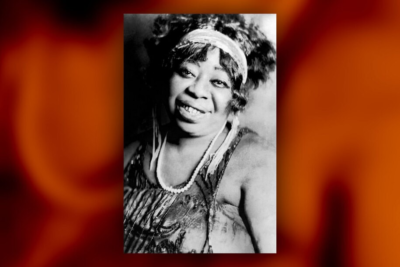 Black Music Sunday: Meet Ma Rainey, the Mother of the Blues. By Denise Oliver Velez / Daily Kos
Black Music Sunday: Meet Ma Rainey, the Mother of the Blues. By Denise Oliver Velez / Daily Kos
Few photos exist of Ma Rainey, so you’ll see this one, from 1923, quite a bit in this story
As we kick off Women’s History Month—and publish our 150th installment of Black Music Sunday—it seems appropriate to pay tribute to the woman who was, during her lifetime known as “the Mother of the Blues,” yet who has been too often overlooked in our her-stories after her death. There is no film footage of this influential artist, even though she made over 100 recordings during her lifetime. How is this possible? Read more
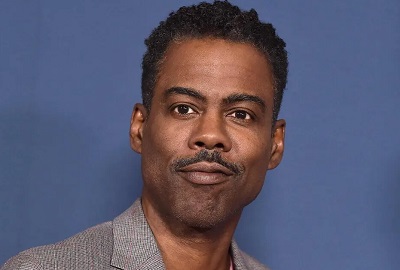 Chris Rock Mocks Will Smith in Live Netflix Special, Addressing Oscars Slap. By Julia Jacobs / NYT
Chris Rock Mocks Will Smith in Live Netflix Special, Addressing Oscars Slap. By Julia Jacobs / NYT
Nearly a year after Will Smith slapped him onstage at the Oscars, Chris Rock joked about the explosive moment on a live Netflix show Saturday night, using the last few minutes to mock Smith and his wife, Jada Pinkett Smith. “Now I watch ‘Emancipation,’ just to see him get whooped,” Rock said, referencing last year’s Civil War-era drama in which Smith plays an enslaved man who is forced to labor for the Confederacy. Read more
Sports
 Quarterbacks Bryce Young, C.J. Stroud and Anthony Richardson are set to make NFL draft history. By Jason Reid / Andscape
Quarterbacks Bryce Young, C.J. Stroud and Anthony Richardson are set to make NFL draft history. By Jason Reid / Andscape
Three Black quarterbacks are expected to be selected in the first round, a first for the league since 1999
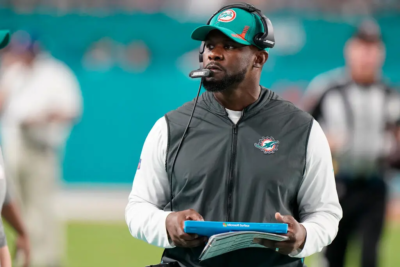 Brian Flores’s Discrimination Case Against the N.F.L. Can Move to Court. Ken Belson and Vrentas / NYT
Brian Flores’s Discrimination Case Against the N.F.L. Can Move to Court. Ken Belson and Vrentas / NYT
A judge ruled that the former Miami Dolphins coach’s claims of discrimination against the league were not subject to private arbitration, opening a path for a public airing of grievances.
Brian Flores, who in a lawsuit accused the N.F.L. and its teams of discriminating against him and other coaches of color in their hiring practices, can proceed with his case, a federal judge ruled Wednesday. The ruling, by Judge Valerie E. Caproni of the U.S. District Court for the Southern District of New York, means that Flores can press his case through the judicial system rather than seeking a resolution in private arbitration, a process that is overseen by N.F.L. Commissioner Roger Goodell. Read more
 After Three Decades of Waiting, Dana Brown Gets His Shot. By Tyler Kepner / NYT
After Three Decades of Waiting, Dana Brown Gets His Shot. By Tyler Kepner / NYT
Brown helped Atlanta win a World Series and fostered the careers of other baseball executives. Now he will lead Houston as M.L.B.’s only Black general manager.
Brown, 56, is the only Black general manager in Major League Baseball. (Kenny Williams is the executive vice president of the Chicago White Sox, outranking that team’s general manager, Rick Hahn.) Brown had interviewed to lead a team’s front office twice before, with Seattle and the Mets, but this was the first time he had spoken with a team owner during the process. Read more
 He Was Billed as the Next LeBron. But Will Emoni Bates Make It at All? By Billy Witz / NYT
He Was Billed as the Next LeBron. But Will Emoni Bates Make It at All? By Billy Witz / NYT
Bates was on a magazine cover at 15. He was playing Division I college basketball at 17. Now he’s 19, his college career may be over, and N.B.A. success is anything but guaranteed.
It was a little more than three years ago when his baby-faced portrait filled the cover of Sports Illustrated under the words “Magic, Michael, LeBron … and the 15-Year-Old Who’s Next in Line.” His height and lithe frame made comparisons to Kevin Durant inevitable. But now, the plan — which included his father’s creating a high school for him to play at; leaving for college a year early, at 17; and aiming to be the first pick in the N.B.A. draft — has taken a detour. Read more
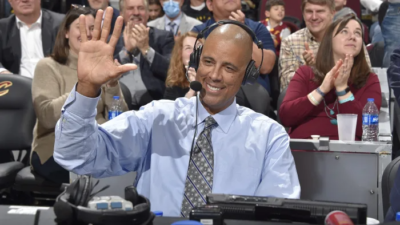 ‘It’s all worth it’: Brad Daugherty savors his historic victory at Daytona 500. By Marc J. Spears / Andscape
‘It’s all worth it’: Brad Daugherty savors his historic victory at Daytona 500. By Marc J. Spears / Andscape
The five-time NBA All-Star became the first Black NASCAR team owner to win the legendary race
Former Cleveland Cavaliers star Brad Daugherty was sitting in the dark, alone at home in Orlando, Florida, nervously watching the Daytona 500 after enduring a recent eye surgery to repair a retina tear. Driver Ricky Stenhouse Jr. was in position to not only make history for JTG Daugherty Racing but for African Americans as well. As Stenhouse earned the checkered flag, Daugherty yelled out to himself, “We just won the Daytona 500” knowing he just became the first Black owner to win the race in what also happened to be Black History Month. Read more
Site Information
Articles appearing in the Digest are archived on our home page. And at the top of this page register your email to receive notification of new editions of Race Inquiry Digest.
Click here for earlier Digests. The site is searchable by name or topic. See “search” at the top of this page.
About Race Inquiry and Race Inquiry Digest. The Digest is published on Mondays and Thursdays.
Use the customized buttons below to share the Digest in an email, or post to your Facebook, Linkedin or Twitter accounts.